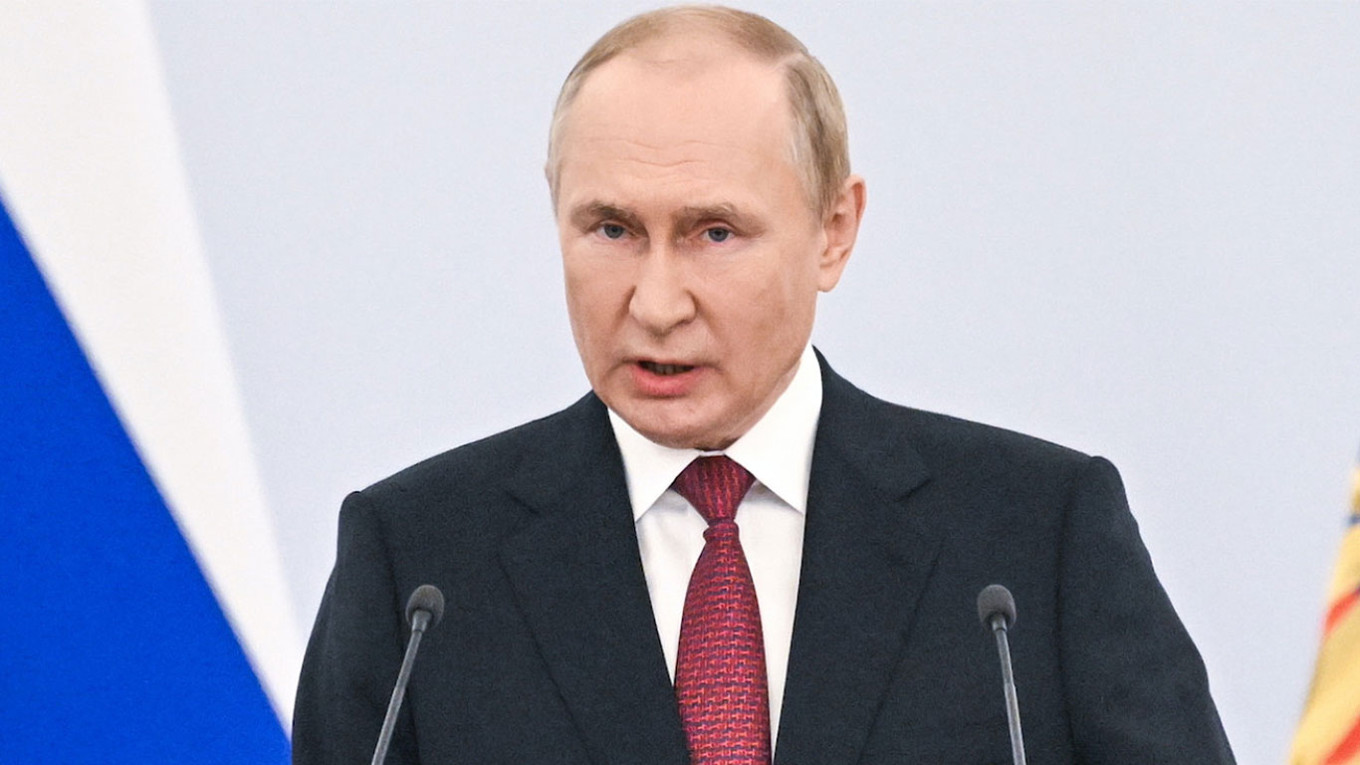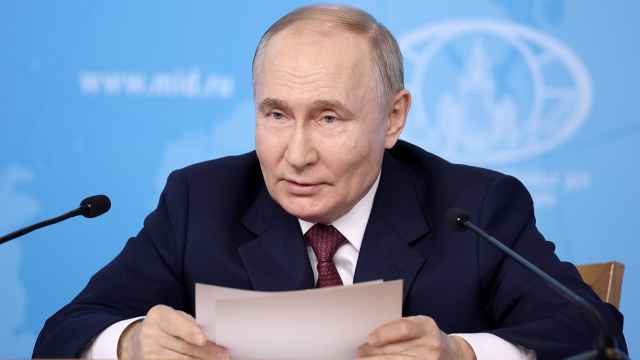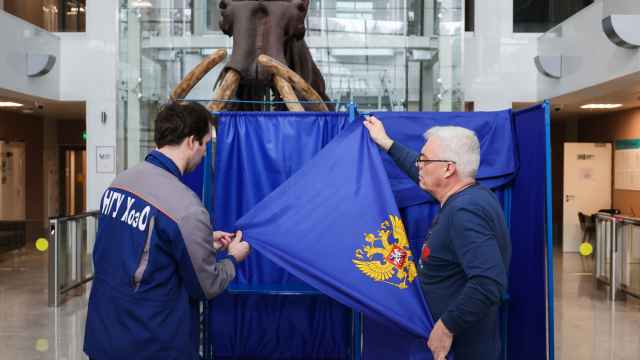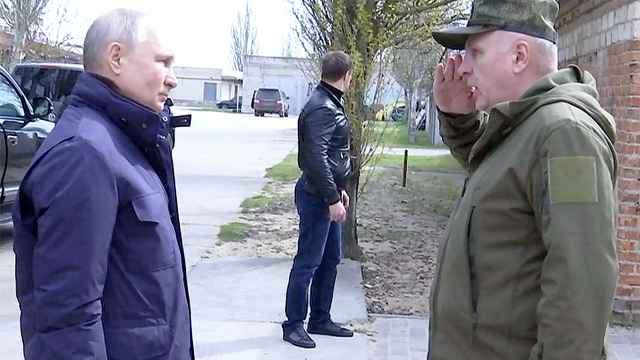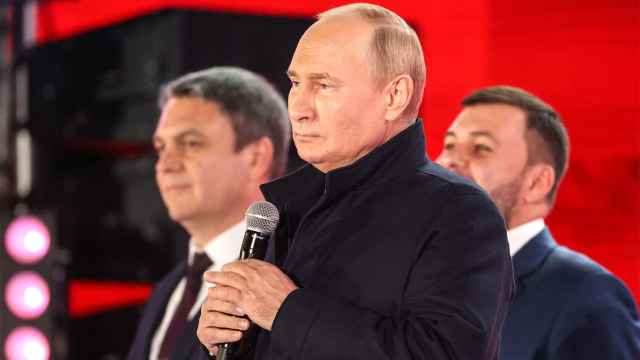Russian President Vladimir Putin signed off on the annexation of four partially occupied Ukrainian regions Friday in a major escalation of Moscow’s seven-month war with its pro-Western neighbor.
Putin confirmed the annexation of the eastern Donetsk and Luhansk regions as well as the southern Zaporizhzhia and Kherson regions in a televised ceremony in the Kremlin's St. George's Hall.
Ukraine and its allies in the West have vowed never to recognize the annexation, calling it a blatant violation of Kyiv’s sovereignty.
“People living in Donetsk, Luhansk, Zaporizhzhia and Kherson are becoming our citizens forever,” Putin said in a combative 40-minute speech, calling on Ukraine to lay down their arms and come to the negotiating table.
“We will defend our land with all the means we have available to us,” Putin told the room filled with hundreds of lawmakers and officials, including the occupied regions’ Moscow-installed leaders.
After signing the annexation accords, Putin and the four Moscow-installed proxies joined hands and chanted "Russia! Russia! Russia!"
Russia's parliament is expected to ratify the treaties next week, after which the four regions will formally become part of Russia.
The 'Satanic' West
In a speech filled with unprecedented anti-American rhetoric, Putin railed against Western colonialism and imperialism, claiming that the United States wanted to turn Russia into a colony.
“The dictatorship of the Western elite is directed against all societies, including against the peoples of those Western countries themselves. It’s a challenge for all. This means the total negation of the human, the overthrow of religion and traditional values as the crushing of freedom becomes to look like the opposite of religion – open Satanism,” he said.
“The West is prepared to cross every boundary in order to preserve its neo-colonial system,” he said. “They want to see us as a colony… they don’t want to see us as a free society but as a crowd of slaves.”
Putin blamed the United States for this week’s unexplained explosions at the Nord Stream pipelines that have left them leaking huge amounts of natural gas into the Baltic Sea.
“It’s obvious to everyone who did it,” he said.
He alleged that Washington is "still, in effect, occupying” countries like Germany, Japan and South Korea.
And he slammed Washington's past use of nuclear weapons, comments that follow his warning last week that he “wasn’t bluffing” about resorting to “any means necessary” in Ukraine.
“The U.S. is the only country in the world to have used nuclear weapons,” Putin said. “Creating a precedent.”
Experts drew contrasts between Putin's speech and the Kremlin's upbeat rhetoric in 2014, when it annexed Crimea from Ukraine.
“This speech was meant to be a ‘mobilization’ of joy like it was 2014,” Andrei Kolesnikov, an expert in Russian politics at the Carnegie Endowment for International Peace, told The Moscow Times.
“But it was built on the language of hatred. Everything that Putin said about the West, he could address to himself.”
Mandatory celebration
Putin later addressed thousands of Russians who gathered in Red Square in front of a stage emblazoned with the words “Donetsk. Luhansk. Zaporizhzhia. Kherson. Russia!”
“Today is a day of truth and justice,” Putin said, flanked by the Moscow-appointed leaders of the annexed regions. “Russia not only opens the doors of our home for our brothers and sisters but also opens its heart.”
Putin led the crowd in a chant of “hurrah!” for soldiers on the frontline and said that “we have become stronger because we are together.”
While one Muscovite present at the rally said “we are filled with pride” in a short TV interview, it appeared that many in the crowd had been forced to join the celebrations.
“We were told that it’s a must and everyone has to go and stand there with Russian flags,” one state employee told The Moscow Times on condition of anonymity.
“No one really wants to be there, but we are afraid of possible consequences,” she said via text message.
“No one is talking about politics or Ukraine. It seems that some people here are drunk, singing the anthem and waving flags,” she said.
'No longer a leader but a follower'
Putin's public appearances and announcement of the annexation cap a whirlwind 10 days during which the Kremlin launched a “partial” mobilization and staged internationally condemned referendums in occupied Ukraine.
And it takes place seven months into Moscow’s invasion of its pro-Western neighbor, a campaign that has been marked by repeated military setbacks.
For Putin, the annexation is a last-gasp attempt to portray the war as a success, according to political analyst Abbas Gallyamov.
“By annexing the areas, Putin will try to portray that he is unbeaten. But the Kremlin is just going with the flow — it’s no longer a leader but a follower,” said Gallyamov, a former speechwriter for Putin.
Combined with Crimea, which Moscow annexed from Kyiv in 2014, Russia now lays claim to roughly 20% of Ukraine.
Yet Russia does not control the entirety of Donetsk, Luhansk, Kherson or Zaporizhzhia regions, and Ukraine has continued to regain ground in its ongoing counteroffensive.
Kyiv’s forces appeared poised Friday to encircle Lyman, a strategic town just north of the Donetsk region.
Shortly after Putin's speech, Ukrainian President Volodymyr Zelensky announced that Kyiv was applying for accelerated accession to NATO.
"De facto, we have already made our way to NATO. Today, Ukraine is applying to make it de jure," Zelensky said.
And the U.S. announced "severe" new sanctions against Russian officials and the country's defense industry in response to the Kremlin's annexation, which President Joe Biden condemned as "fraudulent.”
A Message from The Moscow Times:
Dear readers,
We are facing unprecedented challenges. Russia's Prosecutor General's Office has designated The Moscow Times as an "undesirable" organization, criminalizing our work and putting our staff at risk of prosecution. This follows our earlier unjust labeling as a "foreign agent."
These actions are direct attempts to silence independent journalism in Russia. The authorities claim our work "discredits the decisions of the Russian leadership." We see things differently: we strive to provide accurate, unbiased reporting on Russia.
We, the journalists of The Moscow Times, refuse to be silenced. But to continue our work, we need your help.
Your support, no matter how small, makes a world of difference. If you can, please support us monthly starting from just $2. It's quick to set up, and every contribution makes a significant impact.
By supporting The Moscow Times, you're defending open, independent journalism in the face of repression. Thank you for standing with us.
Remind me later.




